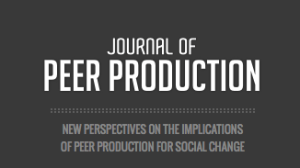New article: Hacktivism, infrastructures and legal frameworks in community networks: the italian case of Ninux.org
|
An interdisciplinary article on the italian wireless community network, published in the open access Journal of Peer Production (2016).
Stefano Crabu, FISPPA Department, University of Padua Federica Giovanella, Faculty of Law, University of Trento Leonardo Maccari, Department of Information Engineering and Computer Science (DISI), University of Trento Paolo Magaudda, at FISPPA Department, University of Padua Community Networks (CN) are an emerging world-wide phenomenon that is receiving growing attention from a number of different disciplines. A CN is an infrastructure for digital communication, an alternative to the mainstream approach of commercial Internet Service Providers (ISPs). It resembles a scaled-down Internet and is used to interconnect a community of people who share particular goals and motivations. By developing a multidisciplinary perspective at the intersection between science and technology studies, law and informatics, this paper analyses the cultural, technical and institutional features of Ninux.org, the most important Italian CN. Ninux.org, based on wireless technology, is made up of more than 320 nodes all over Italy, although mostly concentrated in Rome. This paper provides insights into the political, technical and legal issues of the network, highlighting how tightly interwoven these are, to the extent that they cannot be properly understood in isolation. The paper starts by describing the phenomenon of the CNs; sketching its historical development, the motivations underlying the foundation and use of these networks, their functioning and main legal implications. This introduction is followed by an examination of the specific case of Ninux.org, looking at practices, discourses, and interactions among activists participating in the project. On the basis of this analysis, the paper moves on to consider some technical characteristics and specifications of the network, revealing how the technological infrastructure only partially realises an effective decentralisation and horizontal organisation of the network. We also consider some of the legal constraints imposed by the Italian and European normative frameworks, and the need for Ninux.org to address regulatory issues in the near future. Finally, on the basis of our multi-perspective analysis of this Italian CN, the paper outlines some ways in which the community network could be strengthened, and its participants helped to develop reflexive tools to implement their initial vision of decentralisation. Download a PDF versione of the article |
